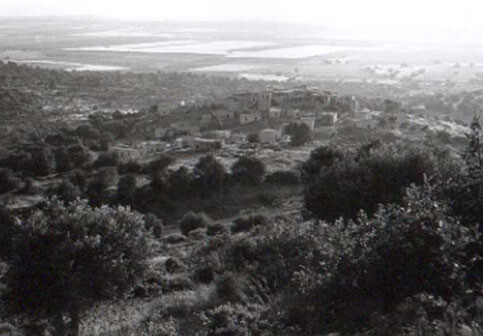4 March 2004

General view of Ayn Hod, a village in the Haifa District, before the expulsion of its inhabitants in July 1948 (Photo: PalestineRememberd/Rachel Jones)
Prospects for Israel’s long-term stability will remain uncertain unless the systemic inequities facing the country’s Arab citizens are addressed.
Identity Crisis: Israel and Its Arab Citizens (PDF) the latest report from the International Crisis Group, analyses relations between Israel’s Jewish majority and its Arab minority, who make up roughly 20 per cent of the population. The report argues for immediate steps to redress discriminatory practices and lessen inter-communal tensions, and for the launch of an inclusive process to define the state’s long-term attitude towards its Arab citizens.
“This is a critical test for Israel’s political system: it must prove to the Arab minority that it is capable of delivering equality”, says ICG’s Middle East Senior Analyst Daniel Levy. “Further failure can only deepen already volatile tensions”.
The problem runs deep and is not easily resolved because it goes to the heart of Israel’s self-definition as both a Jewish and a democratic state and because of the complex, multi-layered nature of inter-communal relations - an Arab minority living in a Jewish state that is in conflict with its far more populous Arab neighbours. Fear and mistrust deepen the divide between Israel’s two populations. Mutual perceptions typically have been characterised at best by indifference, at worst by total misunderstanding and hostility.
Jewish Israelis question the willingness of their Arab counterparts to come to terms with the state of Israel, often perceiving them as a security and demographic threat. With increased allegations of cooperation between Arab Israelis and Palestinian militant groups, such perceptions have further solidified since the outbreak of the second intifada in 2000.
Arab citizens, on the other hand, feel neglected and discriminated against by the state, particularly on issues of land ownership, resource allocation and political representation. While they enjoy political rights unknown to many in the region, they are largely cut off from the geographical, cultural, economic and political mainstream and subjected to various forms of discrimination. Increased tolerance by the Israeli body politic for extremist rhetoric, combined with hostile legislation and the participation in the Israeli government of parties openly advocating the transfer of Arab citizens out of the country, has further heightened tensions
Resolving Israel’s external conflict with the Palestinians should significantly improve the situation of its Arab citizens. But it will not fully resolve the problem, and unless appropriate steps are taken in advance, certain tensions could even be exacerbated.
“If a process is not set in motion to integrate Israel’s Palestinian citizens better and to think seriously about a new, more inclusive and non-discriminatory political contract, Israel faces the prospect of a growing and potentially hostile community in its midst”, says ICG’s Middle East and North Africa Program Director, Robert Malley.
Related Links